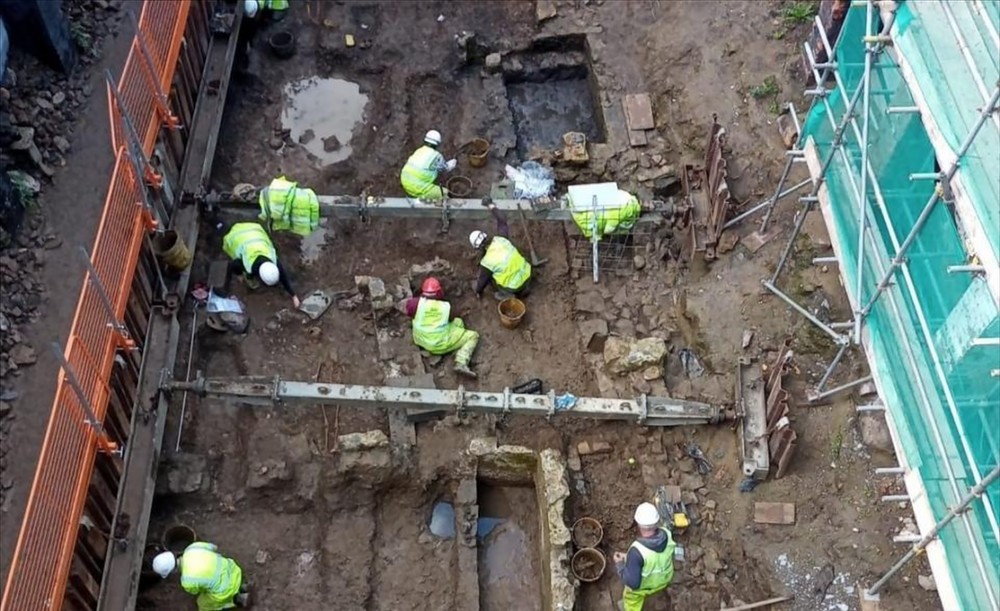The discovery of hundreds of dead bodies has massively increased costs of a major town centre redevelopment

Bruce Sinclair, local democracy reporter
The unexpected discovery of hundreds of human remains during the redevelopment of Haverfordwest’s Ocky White building has massively increased project costs to the council.
Last year’s discovery at the town centre site is one of the town’s most comprehensive archaeological digs in its history.
Dyfed Archaeological Trust started digs at the Bridge Street site after human remains were found during demolition works to prepare for a new £6m food market being built on the site of the old Ocky White’s department store.
The Ocky White building was situated on the site of a 19th century blacksmiths and a burial ground dating back to the 1200s.
The Trust had been in search of the Priory of St Saviours, a prestigious Dominican Friary dating back to 1246, which was located in the area, but the exact location was unknown.
The friary remained an important factor in town life until its suppression in 1538 during Henry VIII’s dissolution of the monasteries.
Hundreds of skeletons were found in the ancient burial ground, with roughly 50 per cent of them being children.
A mysterious puncture wound was found in one of the skulls excavated, which may provide evidence of medieval warfare in the town.
Andrew Shobbrook, from Dyfed Archaeological Trust, told the BBC that one theory was that the victims were from the last Welsh war of independence.
“We know that the town was besieged in 1405 by Owain Glyndŵr and they could be victims of that conflict,” he said.
“It’s quite a prestigious place to be buried. You have a range of people, from the wealthy to general townsfolk.”
Milford Haven
In 1405 a French force sailed to Pembrokeshire to join up with Owain Glyndŵr’s forces, landing at Milford Haven. Henry IV demanded that the Welsh Marches rise up to resist the oncoming force.
The French attacked Haverfordwest, defeating an army there but did not manage to take the castle itself. They then moved on to Tenby, before plundering and burning Carmarthen alongside Owain Glyndŵr’s own forces.
The archaeological findings were welcomed by local historian, and county councillor, Dr Simon Hancock.
“This was an exceptionally important complex in the history of the town of Haverfordwest and it’s wonderful to think that work can finally be done to assess how the friary may have once looked and how it would have operated,” he said.

Costs
At the March meeting of Pembrokeshire County Council, Councillor Andrew Edwards asked for an update on the Ocky White site.
“As the eagerly-anticipated Ocky White building draws to a conclusion, can the relevant cabinet member give council a breakdown of costs so far,” Cllr Edwards asked.
Cabinet member for economy Cllr Paul Miller said the overall costs amounted to £5.829m, including a building purchase cost of £288,000.
Cllr Edwards also asked how the recent archaeological works had affected costs, asking: “Was there any overspending with the finding of the bones underneath?”
Cllr Miller said: “Yes, certainly there was,” adding Cabinet had previously backed revisions to the total approved budget of £12.34m, adding it was “significantly in excess of where we wanted to be when the project started”.
He added: “The key unforeseen has clearly been very significant archaeological work that has basically meant – not quite as straightforward as this – but basically meant the key contractor having to sit around being paid watching archaeologists dig bones out, move them around and take them to the shop opposite.
“It has been a wildly expensive and difficult exercise for the programme, but we are confident it will make a huge and significant positive contribution to Haverfordwest when it is completed this year.”
Councillor Simon Hancock, who presided over the meeting, joked: “I think the Dominican Friars have a lot to answer for, don’t they?”
Support our Nation today
For the price of a cup of coffee a month you can help us create an independent, not-for-profit, national news service for the people of Wales, by the people of Wales.







This should have been foreseen and allowed for…
Almost forgotten about this so we’ll done Nation Cymru for keeping it in the public domain, meanwhile the BBC in London creaming themselves over more Anglo Saxon finds in Leicester.
Did you realy think ‘dead bodies’ was a better term than graves?
Don’t blame the friars for giving people a decent burial, rather was the likelihood of such a discovery buried to enable the costs to be where they were wanted to be?